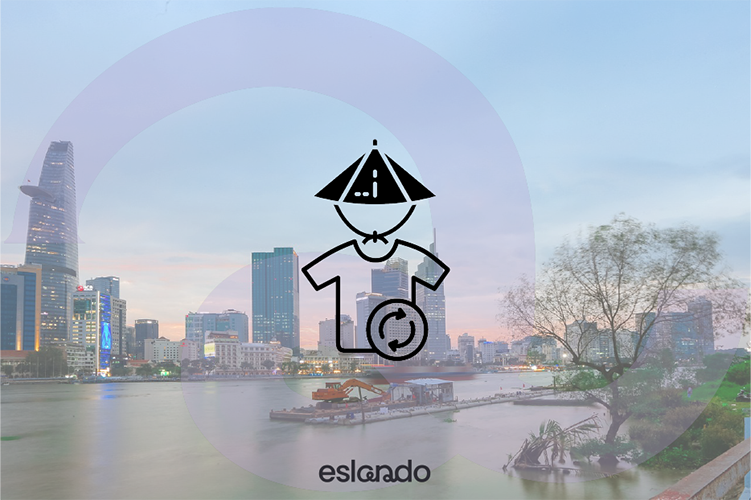Vietnam: The Booming Hub for Textile Recycling

The textile recycling industry is experiencing rapid growth, and Vietnam is quickly emerging as a key player. Right after China and Bangladesh, Vietnam holds the position of the third-largest textile exporter globally, boasting an impressive export value of $36.9 billion. This strong foundation in textile manufacturing, coupled with a growing focus on sustainability, makes Vietnam a prime location for textile recycling.
Why Vietnam is the Preferred New Hub for Recyclers:
Vietnam’s rise as a textile recycling hub is driven by several factors. The country already has a booming textile industry and the presence of the world’s largest brands such as Nike, Adidas, and Uniqlo among the top few. Its established textile industry generates a significant amount of pre-consumer waste, estimated by GIZ at around 250,000 tonnes annually. A pre-existing network of over 230 waste collectors and pre-processors, along with 40 established recyclers, provides a solid infrastructure for the industry. This existing ecosystem, combined with government support for sustainable practices and a readily available workforce, makes Vietnam an attractive destination for both established and emerging recycling companies. The country’s strategic location in Southeast Asia also facilitates access to both regional and global markets.
Capacity Build-Up and Issues:
Vietnam is witnessing significant capacity expansion in textile recycling. Major players like Syre (250,000 tonnes), Ambercycle (capacity TBA), and Recover (10,000 tonnes/year for cotton) are establishing or expanding operations. However, even with this growth, capacity remains a concern. Syre, for instance, has noted that their factory requires 300,000 to 400,000 tons of raw materials annually, while domestic supply can only provide 40,000 to 60,000 tons, highlighting the need for imports.
Concerns for Recyclers:
A significant challenge for recyclers in Vietnam is the import of raw materials. Imported raw materials, including used clothes and fabrics (HS code 6309), face restrictions. These materials are classified as “used consumer goods, medical equipment, and vehicles which are banned from import under Circular 08/2023” by the Vietnamese Ministry of Industry and Trade. This regulation presents a major hurdle for recyclers who rely on imported feedstock to meet their production needs. Navigating these regulatory complexities is crucial for the continued growth of the textile recycling industry in Vietnam.
Is There Room for More?
Despite existing recycling facilities and the upcoming capacity of large players, the demand for recycled textiles is growing rapidly. The raw material supply challenges faced by companies like Syre suggest that there is indeed room for more recyclers, particularly those who can effectively source and process domestic waste or navigate import regulations. Innovation in sourcing, pre-processing, and recycling technologies will be key to addressing the raw material gap and ensuring the long-term sustainability of the industry in Vietnam.
Build Your Textile Recycling Ecosystem on Eslando’s Marketplace
Eslando is here to connect you with the key players. Our platform brings together recyclers, waste collectors, pre-processors, and other stakeholders, creating a thriving ecosystem for circular and sustainable textiles. Join Eslando today to build your network, source the materials you need, and be part of the growing global textile recycling revolution.
Sources:
- GIZ. (n.d.). Ecosystem mapping of the textile and garment industry in Vietnam. Retrieved from https://www.giz.de/de/downloads/giz2025-en-ecosystem-mapping.pdf
- Global Fashion Agenda. (2023, November 14). Insights on textile waste opportunities in Vietnam. Retrieved from https://globalfashionagenda.org/news-article/insights-on-textile-waste-opportunities-in-vietnam/
- Recycling Today. (2024, January 2). Textile recycler to open manufacturing facility in Vietnam. Retrieved from https://www.recyclingtoday.com/news/textile-recycler-to-open-manufacturing-facility-in-vietnam/
- The Investor. (2023, June 29). Swedish textile firm Syre eyes $1 bln fibre factory in central Vietnam. Retrieved from https://theinvestor.vn/swedish-textile-firm-syre-eyes-1-bln-fiber-factory-in-central-vietnam-d14579.html
- Vietnam Briefing. (2023, April 20). Seizing investment opportunities: Vietnam’s textile and garment industry. Retrieved from https://www.vietnam-briefing.com/news/seizing-investment-opportunities-vietnams-textile-garment-industry.html/